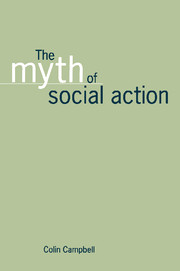Book contents
- Frontmatter
- Contents
- 1 Introduction
- 2 Action reported missing in action theory
- 3 Action and social action
- 4 Action versus social action
- 5 The rise of social situationalism
- 6 The argument by denial
- 7 Accounts and actions
- 8 The argument by exclusion
- 9 The argument through incorporation
- 10 The ‘learning everything from others’ thesis
- 11 The communicative act paradigm
- 12 The linguistic turn for the worse
- 13 The myth of social action
- 14 The obstacle which is social situationalism
- 15 Epilogue: bringing action back in
- Notes
- Bibliography
- Index
8 - The argument by exclusion
Published online by Cambridge University Press: 07 May 2010
- Frontmatter
- Contents
- 1 Introduction
- 2 Action reported missing in action theory
- 3 Action and social action
- 4 Action versus social action
- 5 The rise of social situationalism
- 6 The argument by denial
- 7 Accounts and actions
- 8 The argument by exclusion
- 9 The argument through incorporation
- 10 The ‘learning everything from others’ thesis
- 11 The communicative act paradigm
- 12 The linguistic turn for the worse
- 13 The myth of social action
- 14 The obstacle which is social situationalism
- 15 Epilogue: bringing action back in
- Notes
- Bibliography
- Index
Summary
In advancing this argument, the advocates of situationalism hope to resolve the problem of justifying restricting the subject-matter of sociology to social action and hence disregarding action by allocating the two phenomena to separate paradigms or disciplines. The rationale for reducing three concepts to two is thus provided by claiming that ‘action’ actually belongs to a different interpretive or explanatory schema to that which applies to ‘social action’. This tactic of representing the theory of action as entirely separate from, and indeed in large measure opposed to, the theory of social action is a very effective means of reducing the classical conceptual trichotomy to the modern dichotomy. What can be said in its favour is that, unlike the argument by denial, it does at least have the merit of recognising the existence of individual action and subjective meaning and hence the necessity of studying them under one rubric or another. However, it still represents an attempt to marginalise their investigation, either by restricting it to some form of theoretical ghetto within sociology, or by displacing it into another discipline. Whilst, at the same time, the aim remains that of claiming a monopoly over the study of ‘meaning’ and the interpretive tradition for the social action paradigm.
Julian Freund is one sociologist who employs this tactic. He declares that action and social action relate to contrasting paradigms and that interpretive sociology is only interested in the latter. Non-social or individual action, by contrast, he deems to be only suitable for study by ‘causal sociology’. Understandably perhaps, given situationalism's close links with the sub-discipline, this is also an argument which appeals to social psychologists.
- Type
- Chapter
- Information
- The Myth of Social Action , pp. 84 - 93Publisher: Cambridge University PressPrint publication year: 1996



